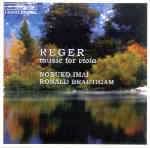The ghost of Bach hovers over Max Reger’s Op. 131 unaccompanied suites, filtered of course through Reger’s own brand of late-19th-century chromatic harmony. Not many violists have essayed all three on disc. Some collectors may know Pierre Franck’s solid traversals on the Pierre Verany label, and better still, Hirofumi Fukai’s impassioned, superbly engineered performances on Signum. A 2000 release on Calliope with violist Jaromír Klepac offered the suites alongside sonatas by Clarke and Martinu. However, Nobuko Imai’s entry in the solo Reger sweepstakes easily ascends to the top of this distinguished short list.
For all the eloquence and purity of Klepac’s sonority, Imai’s is richer in timbre and more varied in terms of nuance, dynamic gradations, and vibrato deployment. Her low notes resonate with the fullness of a cello, and her double-stops are impeccably controlled and squarely in tune. Indeed, the E minor suite’s Adagio almost sounds like two well-rehearsed violists playing on different instruments! And Imai’s vivace movements are infinitely more incisive, swinging, and rooted in dance than Klepac’s flabbier, less characterized treatments.
She and pianist Ronald Brautigam collaborate well in the big B-flat sonata, which loses little in translation from its clarinet/piano original. The musicians take a generally steady and direct path through the first movement. They make the music’s points largely through color and ensemble balance and do not give in to the composer’s frequent espressivo and agitato markings as in the more volatile (and equally valid) approach of Barbara Westphal and Jeffrey Swann (Bridge). The second movement’s abrupt shifts in mood and tempo are navigated to perfection, abetted by Brautigam’s crisp, assertive support and seamless transitions.
For me, the Adagio embodies some of Reger’s most lyrical inspirations, and the performers respond accordingly. The concluding Allegretto is played with all the charm, nimble interplay, and inner strength the music demands. Perhaps I would have placed the little 1901 Romance at the end of the disc as an encore rather than as the opening track, but then again, that’s why God invented programmable CD players! Gorgeous sonics, first-class musicianship, and substantial compositions that deserve wider recognition: these are ingredients that add up to an unqualified “must-have” recommendation.
































